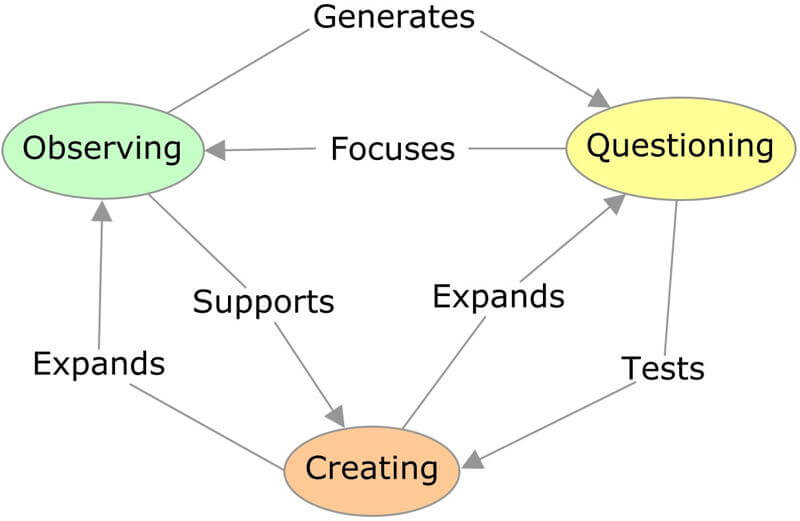Questioning
Questioning is the process of requesting information, and it is one of the critical components for learning, thinking creatively, and creating something original. When you ask yourself a question, your mind focuses its resources to find an answer: what you know currently, what you conclude through reasoning, and what you have observed and are presently observing. Our brains are busy processing data from our senses and other thoughts, so the brain subconsciously analyzes our thoughts through connections previously used in similar scenarios (called mind grooving). A brain in mind-grooving mode doesn’t entirely focus on the creative opportunities that are possible. An insightful question helps our brain bring its full focus to the challenge, kicking us out of the mind-grooving mode.

A concept map showing how questioning influences creative thinking.
Humans and Questions
Questions come in all sizes and importance. Some are big and broad, some are narrow and focused, some open the world of thought. Humans love information; we seem to crave what we don’t know. Questions help us gather the data we are seeking. They may be a request to others or yourself, but questions almost always lead to new ones. How often does an answer satisfy a curious mind?
Are All Questions Equal?
Since questions help us gain information, you would expect that they all are equal in importance. When you are new to a topic, we tend to ask specific, more focused questions to learn about the separate issues. Seeing the big-picture scenarios requires more familiarity with all of the concepts. As you become more familiar with a topic, problems you explore become more open-ended (those that need one’s full knowledge to respond to). But consider how open-ended questions expand your early exploration: “How can I use this idea in my world?” And “How does this fit into what I already know?” Exploratory questions expand the reasons to learn more, regardless of how familiar you are with the problem.
Some questions are close-ended since they shut down our drive for more information. They limit our conversations with others and ourselves. Similar to mind grooving, our busy brain subconsciously favors close-ended questions. But you can create habits that produce more effective results. Need some examples?
Can I Measure the Quality of My Questions?
Beagle Learning has developed a method for measuring the quality of questions that drive exploration. Although their question productivity index is intended for college students, their work is important for younger ages to consider. Teachers, explore their methods for creating courses that follow student questions at the end of each class.
The Role of Time in Questioning
How often do you come back to an idea and think about it again? Do you see new connections to explore? Have you ever rushed to meet a deadline and appear to have succeeded? If you look back on your work after a short time, would you make considerable improvements? Succeeding while cramming on an assignment gives you the false illusion that time for revisions and reflection don’t matter. Very few things are perfect, so allow time to revisit an idea at least once before thinking a thought or question is complete.

0 Comments